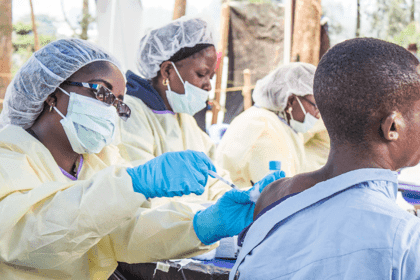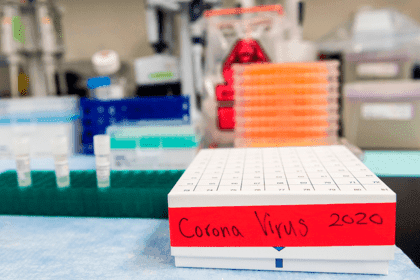
The future of vaccines: four innovations from around the world
World Immunisation Week is an opportunity to celebrate some of the most cutting-edge vaccination projects and technologies from around the world, which have the potential to improve health for millions of people.

To stop outbreaks of new diseases like COVID-19, or of known ones, like measles and polio, we must support and invest in vaccines. Here are four lifesaving innovations.
Vaccines could be developed in months rather than years, to help protect against emerging diseases like COVID-19
Vaccines traditionally take more than ten years to develop. This is not fast enough for responding to a novel threat like COVID-19 or an unknown influenza. Thanks to developments in cutting-edge platform technologies, that is changing.
Researchers at Imperial College London are developing an innovative platform called Rapidvac that could help to develop vaccines for new diseases in months, rather than years.
Pressing play on the video above will set a third-party cookie. Please read our cookie policy for more information.
Vaccine patches could make immunisation cheaper and more accessible than ever before
Syringes have always been essential for delivering vaccination, but that could become a thing of the past. Scientists at the Hilleman Labs in India have developed micro-patches that could soon be used for routine immunisations such as Hepatitis B.
These patches are cheap to produce and easy to store, unlike many vaccines that require expensive and specialist cold chains to keep them viable. The patches don’t need specialist training to be applied, so they could even be used at home. This will make them a potential lifeline for rural and poor families around the world, often excluded from routine immunisation efforts.
Pressing play on the video above will set a third-party cookie. Please read our cookie policy for more information.
Iris scanning could make sure no one gets left behind in the fight against Ebola
By putting research at the heart of the 2014 Ebola epidemic two effective vaccines were developed. These have been instrumental in helping to contain the second largest Ebola outbreak in Central Africa. But in an area with high movement of people and lacking in health infrastructure, how could immunisation workers track who had received the required multiple doses of the Ebola vaccine?
To overcome this, in Rwanda, innovations in iris scanning have helped create digital records. These are also used for other immunisation campaigns, including measles, helping to bring more vaccines to more people.
Pressing play on the video above will set a third-party cookie. Please read our cookie policy for more information.
Human infection studies are helping us to develop better vaccines, faster and cheaper than before
The infection caused by the Shigella bacteria is a leading cause of death for young children globally. Scientists in Kenya are working to develop a vaccine to prevent Shigella using human infection studies – volunteers are deliberately infected with the bacteria, in a controlled environment, to test the efficacy of a potential vaccine.
By using human infection studies the researchers will be able to determine whether the vaccine works, and to more quickly understand the immunity it might provide.
Pressing play on the video above will set a third-party cookie. Please read our cookie policy for more information.
Innovations like these are helping us save more lives than ever before. These are only made possible through investment in research and immunisation across the globe. Let’s make more projects like these possible, let’s get behind the future of vaccines.

